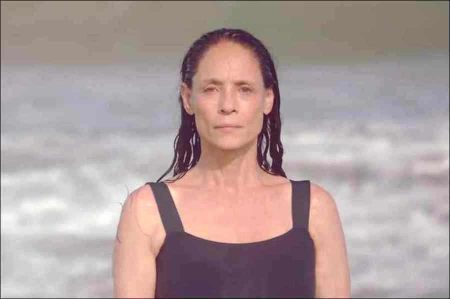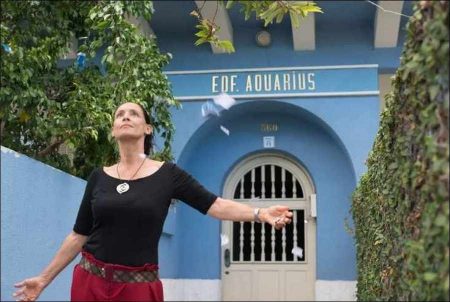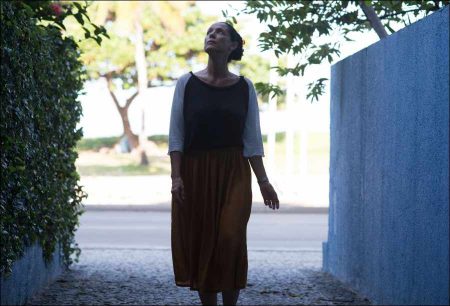Aquarius movie storyline. Clara, a 65-year-old widow and retired music critic, was born into a wealthy, traditional family in Recife, Brazil. She is the last resident of the Aquarius, an original three-story building built in the 1940s in the upper-class, seaside Boa Viagem Avenue, Recife.
All the neighboring apartments have already been acquired by a company which has other plans for it. Clara has pledged to only leave her place upon her death, and she engage in a cold war of sorts with the company. This tension both disturbs Clara and gives her that edge on her daily routine. It also gets her thinking about her loved ones, her past, and her future.
Aquarius is a 2016 drama film written and directed by Kleber Mendonça Filho and starring Sônia Braga as Clara, the last resident of Aquarius building, who refuses to sell her apartment to a construction company that intends to replace it with a new edifice. It was selected to compete for the Palme d’Or at the 2016 Cannes Film Festival.

The film generated uproar in Brazil due to its political connotations, especially because it was released at the apex of the country’s political crisis. The film’s cast and crew actively positioned itself against what they considered to be a coup d’état in Brazil, showing protest signs at Cannes.
A number of controversies were raised over the film, including its nonselection as the country’s entry to the Best Foreign Language Film at the 89th Academy Awards by the Ministry of Culture’s committee, which has been seen as a supposed act of retaliation by Brazil’s new government.
It was nominated for several awards, including the Independent Spirit Award for Best International Film and the César Award for Best Foreign Film. The film was included in a number of critics’ lists of best films of the year, including from Sight & Sound, Cahiers du cinéma and The New York Times.
Film Review for Aquanius
leber Mendonça Filho is the Brazilian critic turned film-maker famed for his first feature, Neighbouring Sounds. Maybe it’s appropriate that his new film, showing in the Cannes competition, has a scene in which its heroine comes close to being driven out of her wits by the people upstairs having an aggressively loud party. It’s a richly detailed character study, immersing the audience in the life and mind of its imperious main character, Clara, who is addressed as “Dona Clara”, commandingly played by Sônia Braga.
She is a retired music critic and public intellectual – with the stylishly preserved beauty of an ageing Audrey Hepburn. Clara is interviewed in the papers about her feelings on listening to vinyl or digital streaming; she is also known for her eclectic tastes and a love of both Heitor Villa-Lobos and Queen. She is widowed, well off, and has cultivated lifelong mannerisms of non-conformist hauteur, bolstered by her late husband’s wealth. She lives in the “Aquarius”, an elegant 1940s apartment building in the seaside town of Recife in north-east Brazil, where she raised her three children, now grown up.
Disaster strikes when a property company decides to buy up all the apartments in the building with a view to knocking it down and putting up a glass-and-steel monstrosity. The firm is fronted by a creepily plausible young business graduate called Diego – coolly played by Humberto Carrão. All the other tenants take the money and run, but Clara makes a last stand, refusing the company’s increasingly mouthwatering offers, then hanging tough when they begin a sinister campaign of harassment and intimidation: abuse, loud parties, mess on the stairwell.
Meanwhile, she is subject to unsubtle pressure from her children to sell up; they are worried about her situation, but also interested in a huge cash boost to their own inheritance, as Clara can’t live forever. As the situation continues, Clara discovers more about a society in which she is out of place, and more about herself.
To some degree, the Aquarius could be a metaphor for Brazil, with the cronyism, corruption and cynicism in its highest reaches. But it is more that the building is the outward expression of Clara: her private fiefdom, which she feels all more keenly, and with a fierce and paradoxical pride, when she becomes the only person left in it. Her siege has given her a late-flowering of stubbornness and purpose.
An opening sequence set in 1980 shows us that Clara has, all her life, modelled her style on her adored Aunt Lucia (Thaia Perez), whose 70th birthday she attends as a young woman with short hair, having just had surgery for breast cancer. Lucia had girlishly long hair, and was known for her political dissidence and daring love life. Flash forward 36 years and we can see how Clara has effectively duplicated Aunt Lucia’s image with long hair: a later scene shows how Clara is impressing a younger woman of her acquaintance, and so the chain of influence may be continuing.
Clara is a sensual person and tormented by her lack of sex – a lack made all the more galling because all the other single and widowed women of her acquaintance seem to have boyfriends. A likely-looking silver fox turns out to be cruelly uninterested in her once he realises she has had breast surgery. So the ordeal of the Aquarius provides a kind of miracle: one of the ways that the property firm finds to hassle her is using the flat above as the location for a porn shoot. But Filho shows that instead of disgusting Clara, it intrigues and amuses her, and inspires her to hire an escort for the evening.
She is also arrogant and snobbish, with a lifelong habit of speaking in front of the servants as if they were invisible. During one family party, in which old photos are being shown, Clara crudely derides an old family retainer for stealing the family’s jewellery; her housekeeper suddenly breaks into the conversation – an all but unheard-of breach of etiquette – and pointedly insists on showing everyone pictures of her son. Filho shows that there is pain in this gesture, and a kind of revenge, as the maid-thief is to recur in Clara’s dreams, with images of blood and fear.
Aquarius doesn’t end in the expected way, and perhaps doesn’t end at all. It is probably flawed in that it depends on a deus ex machina in the form of a certain incriminating legal document which is rather casually crowbarred into the screenplay. Yet this is a densely observed and superbly acted portrait of a woman of a certain age.
Aquarius (2016)
Directed by: Kleber Mendonça Filho
Starring: Sônia Braga, Bárbara Colen, Humberto Carrão, Irandhir Santos, Maeve Jinkings, Pedro Queiroz, Julia Bernat, Zoraide Coleto, Carla Ribas, Fernando Teixeira, Paula De Renor
Screenplay by: Kleber Mendonça Filho
Production Design by: Juliano Dornelles, Thales Junqueira
Cinematography by: Pedro Sotero, Fabricio Tadeu
Film Editing by: Eduardo Serrano
Costume Design by: Rita Azevedo
Set Decoration by: Joana Claude, Bob Kensinger
Music by: Gustavo Montenegro
MPAA Rating: None.
Distributed by: Kino Lorber
Release Date: May 17, 2016 (Cannes), September 1, 2016 (Brazil), October 14, 2016 (Uhiked States)
Views: 15





